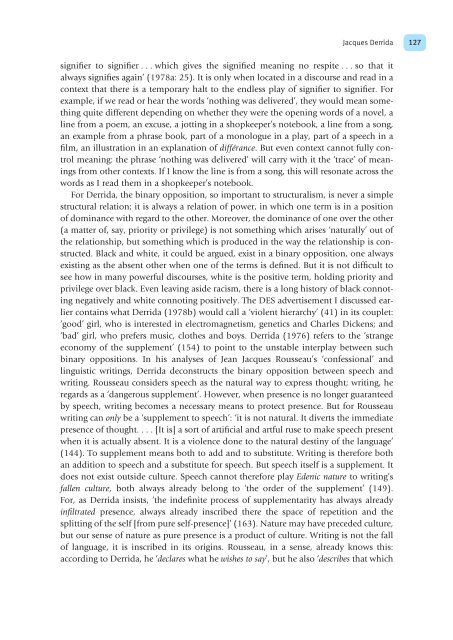Cultural Theory and Popular Culture
Cultural Theory and Popular Culture
Cultural Theory and Popular Culture
You also want an ePaper? Increase the reach of your titles
YUMPU automatically turns print PDFs into web optimized ePapers that Google loves.
Jacques Derrida 127<br />
signifier to signifier . . . which gives the signified meaning no respite . . . so that it<br />
always signifies again’ (1978a: 25). It is only when located in a discourse <strong>and</strong> read in a<br />
context that there is a temporary halt to the endless play of signifier to signifier. For<br />
example, if we read or hear the words ‘nothing was delivered’, they would mean something<br />
quite different depending on whether they were the opening words of a novel, a<br />
line from a poem, an excuse, a jotting in a shopkeeper’s notebook, a line from a song,<br />
an example from a phrase book, part of a monologue in a play, part of a speech in a<br />
film, an illustration in an explanation of différance. But even context cannot fully control<br />
meaning: the phrase ‘nothing was delivered’ will carry with it the ‘trace’ of meanings<br />
from other contexts. If I know the line is from a song, this will resonate across the<br />
words as I read them in a shopkeeper’s notebook.<br />
For Derrida, the binary opposition, so important to structuralism, is never a simple<br />
structural relation; it is always a relation of power, in which one term is in a position<br />
of dominance with regard to the other. Moreover, the dominance of one over the other<br />
(a matter of, say, priority or privilege) is not something which arises ‘naturally’ out of<br />
the relationship, but something which is produced in the way the relationship is constructed.<br />
Black <strong>and</strong> white, it could be argued, exist in a binary opposition, one always<br />
existing as the absent other when one of the terms is defined. But it is not difficult to<br />
see how in many powerful discourses, white is the positive term, holding priority <strong>and</strong><br />
privilege over black. Even leaving aside racism, there is a long history of black connoting<br />
negatively <strong>and</strong> white connoting positively. The DES advertisement I discussed earlier<br />
contains what Derrida (1978b) would call a ‘violent hierarchy’ (41) in its couplet:<br />
‘good’ girl, who is interested in electromagnetism, genetics <strong>and</strong> Charles Dickens; <strong>and</strong><br />
‘bad’ girl, who prefers music, clothes <strong>and</strong> boys. Derrida (1976) refers to the ‘strange<br />
economy of the supplement’ (154) to point to the unstable interplay between such<br />
binary oppositions. In his analyses of Jean Jacques Rousseau’s ‘confessional’ <strong>and</strong><br />
linguistic writings, Derrida deconstructs the binary opposition between speech <strong>and</strong><br />
writing. Rousseau considers speech as the natural way to express thought; writing, he<br />
regards as a ‘dangerous supplement’. However, when presence is no longer guaranteed<br />
by speech, writing becomes a necessary means to protect presence. But for Rousseau<br />
writing can only be a ‘supplement to speech’: ‘it is not natural. It diverts the immediate<br />
presence of thought. . . . [It is] a sort of artificial <strong>and</strong> artful ruse to make speech present<br />
when it is actually absent. It is a violence done to the natural destiny of the language’<br />
(144). To supplement means both to add <strong>and</strong> to substitute. Writing is therefore both<br />
an addition to speech <strong>and</strong> a substitute for speech. But speech itself is a supplement. It<br />
does not exist outside culture. Speech cannot therefore play Edenic nature to writing’s<br />
fallen culture, both always already belong to ‘the order of the supplement’ (149).<br />
For, as Derrida insists, ‘the indefinite process of supplementarity has always already<br />
infiltrated presence, always already inscribed there the space of repetition <strong>and</strong> the<br />
splitting of the self [from pure self-presence]’ (163). Nature may have preceded culture,<br />
but our sense of nature as pure presence is a product of culture. Writing is not the fall<br />
of language, it is inscribed in its origins. Rousseau, in a sense, already knows this:<br />
according to Derrida, he ‘declares what he wishes to say’, but he also ‘describes that which
















